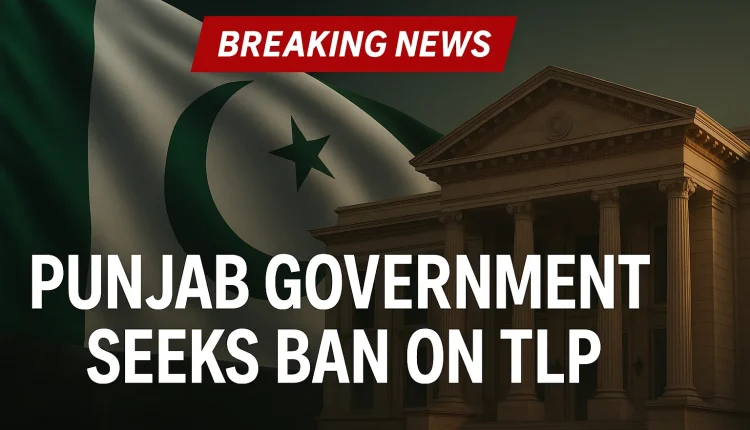Punjab Government Seeks Ban on TLP After Violent Protests | Pakistan Breaking News
Punjab TLP Ban After Violent Protests
The Punjab TLP Ban After Violent Protests has become the top headline across Pakistan Breaking News platforms. The Punjab provincial government has initiated proceedings to ban the far-right religious party Tehreek-e-Labbaik Pakistan (TLP) after days of violent clashes between its workers and law enforcement agencies across the province. Protesters managed to break through multiple security barriers while marching toward Islamabad, prompting an immediate and firm response from the government.
Historic Decision by the Punjab Government
In a meeting chaired by Punjab Chief Minister Maryam Nawaz Sharif, provincial officials approved what they called a “historic” and “extraordinary” set of measures to counter extremist activities. Though TLP was not directly named during the announcement, official sources confirmed that the Punjab TLP Ban After Violent Protests would target the group responsible for inciting unrest and spreading hate speech.
The chief minister’s office announced that party leaders would be added to the Fourth Schedule of the Anti-Terrorism Act, imposing strict movement and communication limits. Anyone found guilty of inciting violence or violating the law will face immediate arrest and prosecution.
Violent Clashes in Muridke and Lahore
The Punjab TLP Ban After Violent Protests follows a weekend of chaos, particularly in Muridke and Lahore, where thousands of TLP supporters clashed with police. Despite heavy security, roadblocks, and trenches dug to halt the protest march, demonstrators broke through several barriers.
Local journalist Ehtesham Shami reported that TLP workers managed to reach Muridke despite severe restrictions, showing how intense and organised the protest had become.
Several police officers were injured, prompting swift retaliation by the Punjab government, which had previously exercised restraint.
TLP’s Controversial History
Tehreek-e-Labbaik Pakistan (TLP) is widely recognised for its far-right stance and its protests over blasphemy issues. The party gained notoriety for glorifying Mumtaz Qadri, who assassinated Punjab Governor Salmaan Taseer in 2011 after Taseer defended Aasia Bibi, a Christian woman accused of blasphemy.
Since then, the party has led multiple violent demonstrations, particularly in 2017, 2020, and 2021. The Punjab TLP Ban After Violent Protests is the government’s most serious attempt yet to curtail its activities.
Previous Protests and Pattern of Violence
According to security analyst Muhammad Amir Rana, this is the first time the state has moved decisively against the TLP for violence against law enforcement. In past protests, police often suffered casualties without strong government response.
“This time, with full state backing, the police were authorised to act,” said Rana. The Punjab TLP Ban After Violent Protests marks a shift from negotiation-based tactics to firm law enforcement.
Legal Proceedings and Fourth Schedule
Under the Anti-Terrorism Act, the Fourth Schedule allows authorities to closely monitor and restrict individuals deemed threats to public order. The Punjab TLP Ban After Violent Protests involves placing party leaders under this law, freezing bank accounts, and restricting movement.
Cases involving martyred police officers and damage to state property will be tried in Anti-Terrorism Courts (ATCs) for quicker verdicts and harsher penalties.
Public Response and Political Implications
While other religious parties like Jamaat-e-Islami and JUI-F held peaceful solidarity rallies earlier this month, none matched the intensity of the TLP’s protests. The Punjab TLP Ban After Violent Protests could lead to more demonstrations, but the government seems determined to maintain order and set a precedent against violent activism.
Federal Approval Process
The Punjab cabinet’s decision now awaits federal government approval before enforcement. If endorsed, the Punjab TLP Ban After Violent Protests will become one of Pakistan’s most significant crackdowns on religious political extremism.
Observers believe Islamabad will weigh both security priorities and the political sensitivities tied to religious groups before giving the final nod.
Expert Analysis
Security experts view the Punjab TLP Ban After Violent Protests as a critical turning point in Pakistan’s approach to extremist politics. Instead of negotiating under pressure, the government is asserting state authority.
However, analysts warn that a simple ban may not be enough. Without addressing root causes—such as socio-economic discontent and the misuse of religion in politics TLP’s influence may resurface under another name.
Conclusion
The Punjab TLP Ban After Violent Protests underscores a major shift in Pakistan’s stance toward extremist movements. As the proposal moves to the federal level, it represents both a test of political will and a signal to all groups that violent protests will no longer be tolerated.
The coming weeks will reveal whether this marks a genuine long-term strategy to counter religious extremism or merely a temporary crackdown in response to public unrest.

